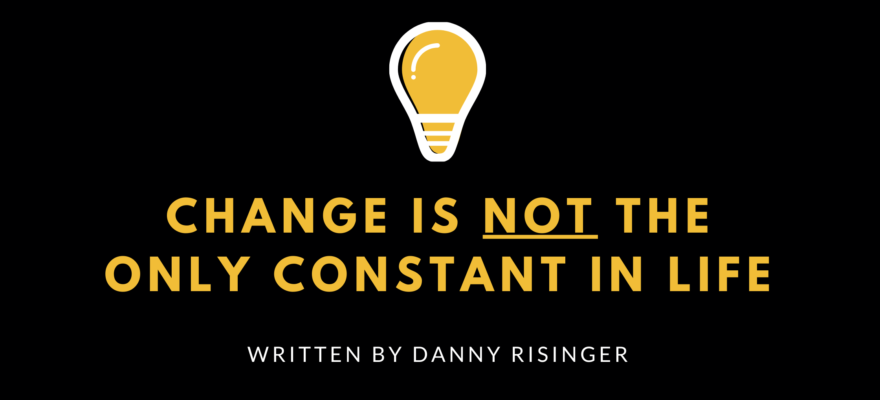“Change is the only constant in life…” — Benjamin Franklin
What do you think about the above quote attributed to Benjamin Franklin?
What kind of mental pictures and thoughts capture your attention at the idea of change?
How does the thought of change impact you on the emotional and spiritual level?
Change…no doubt, it is a reality in everyone’s life. It’s unavoidable; it’s impact can truly be life changing and life altering.
Change stirs the emotions of love, joy, happiness, excitement, gratefulness, and hope. However, it also can touch and stir up emotions of fear, anger, resentment, hopelessness, and anxiety.
I cannot help but think over my life and reflect on the multitude of changes that have impacted my life. I have memories of events throughout my life and how they have changed.
This year marks my 70th year of life and 49th year since I was ordained into ministry. Any changes there? My grandchildren marvel when I share my “when I was your age” stories and they discover that some of the things they have grown up with didn’t exist “then.”
The nature and challenges of the church and ministry have changed radically. Unfortunately, not all of the changes have been for the better. We live in a world that is seeking to push the church, God, theology, the Bible, and the very definition of “right,” “wrong,” and “faith” into a world shaped bottle. And we are feeling the pressure.
In a way, many of us feel that we are nothing more than “collateral damage” and out of control when it comes to finding and determining our own way. We feel that we are unwilling participants to Franklin’s observation that change is the only constant we have…
We are pushed into the corner and confronted by the attitude expressed by Alan Watts , “The only way to make sense our of change is to plunge into it, move with it, and join the dance.”
Dr. Wayne Dyer expressed his philosophy thusly,
“Look upon every experience you’ve ever had, and everyone who’s ever played any role in your life, as having been sent to you for your benefit. In this universe, which was created by a divine, organizing intelligence, there are simply no accidents.”
In his book, Your Erroneous Zones (©1976 – Avon Books), his advice was, “Change the way you look at things and the things you look at change.”
So, is that it? Are we simply powerless victims to change? It is true that change is the only constant in life?
Have you ever heard of a guy by the name of Jesus? He did some really awesome things. He was born of a virgin, lived a perfect and sinless life, went to a cross and was sacrificed on our behalf, shedding his blood and dying so we might receive ultimate forgiveness and the right to become the sons and daughters of God by adoption.
He was placed in a borrowed tomb where his body laid for three days and rose again victorious over sin, death, and hell.
He calls us, as his followers, to love the Lord our God with all our heart, mind, soul, and strength and to love our neighbor (the people in the world) the same way he loves us.
He commissioned his followers to engage the world in which we live, share his message of salvation and make disciples of every nation while teaching them by word and example what it means to be a follower and disciple of Jesus.
He ascended to heaven with the promise that he would return and gather his church to himself for eternity.
Here’s the kicker – not too theological, I know, but – everything I have just shared with you is unchanging and constant, untouched by the world and unphased by those who would oppose him and his truth.
How do I know? Ever read Hebrews 13:8? If not, here it is:
“JESUS CHRIST IS THE SAME YESTERDAY, TODAY, AND FOREVER.”
Years ago, when I was early in my ministry, I was helping one of the church trustees repair a broken waterline at the parsonage (remember those?). As we were working, brother Alva looked me in the eye and asked, “Preacher, did you ever plow a field using a horse?”
“What kind of a question is that?” I thought to myself, he knows I grew up in the city.
He also knew that I was green as a gourd, young, inexperienced, and (dare I say) full of myself. He was setting me up to hopefully teach his young pastor something he needed to learn.
“No, of course not, have you?” What a stupid thing to say! I knew better but the words came out before I could catch them and stuff them back into my throat.
Alva, unphased responded, with a twinkle in his eye, “You familiar with Luke 9:62 where Jesus said that anyone who puts his hand to the plow and looks back isn’t fit for the kingdom of God? Do you know why that was important?”
I just stood there, positive he was going to tell me whether I wanted him to or not.
“When a farmer plowed a field with oxen or horse the only way he could keep his row straight was to focus on an immovable object. He had to keep his eyes fixed on that object. If, at any time, he looked back to see how straight his row was, his plow would go crooked every time.”
“I didn’t know that.” I responded.
“Preacher, the only way to keep your life movin’ forward and plow a straight row is to keep your eyes firmly fixed on the immovable object. That immovable object is Jesus. Don’t ever take your eyes off of him!”
I wish I would have taken Brother Alva’s words more seriously and recognized the wisdom he desired to share with me back then. I would have soaked up every moment with him.
Fortunately, there was enough of that conversation that planted itself in my heart that one day it took root and bloomed. Someday, I’m going to have the opportunity to thank him for seeing something in a young preacher that caused him to share some of his country wisdom and biblical understanding.
Change? Yeah, it’s all around us. Some we can impact, some we can’t. But we can take comfort that change is not the only constant we have in our world and life.
We have an unchanging Savior whose promises, truths, and presence can never be diminished by any change this world throws our way.
About the Author: Danny Risinger is the pastor of Mount Pleasant General Baptist Church in Mount Vernon, Indiana. He recently celebrated 51 years of marriage to his wife Shirley, and 48 years of being an ordained minister. He is a graduate of Oakland City College and Newburgh Theological Seminary.


